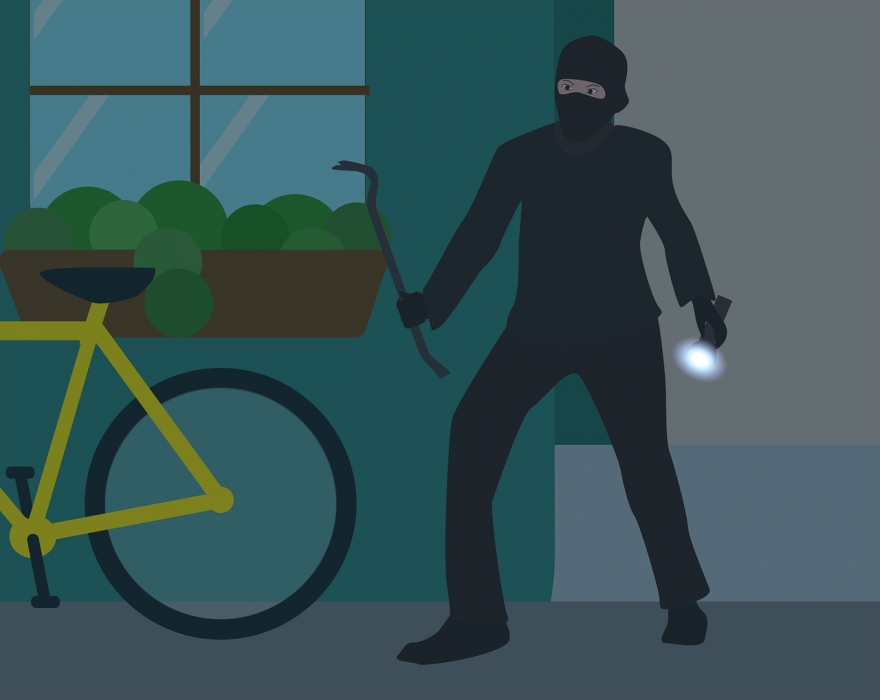Police services across Canada report that during the pandemic, crime has generally been down compared to this time last year. But the bad guys have not gone away – many new scams related to COVID-19 have emerged.
“With cities and communities shut down and Canadians staying at home, it is perhaps not surprising that police reported a drop in some of the more common types of property crime,” says a recent report by Statistics Canada. The study collected data from 17 police services across the country, which serve about 59 per cent of the Canadian population.
It found that residential break and entering was down by 25 per cent from March to August during the pandemic, compared to last year. Motor vehicle thefts were down by 10 per cent.
The report says there was a decline in almost all types of crimes from March to April, when non-essential businesses across the country were closed and most people stayed at home. When businesses began to re-open in May, other crimes increased but property crimes didn’t show an increase until June. Lockdowns during the second wave will likely see the numbers drop again.
Another Statistics Canada study asked 43,000 Canadians about their perceptions of personal safety during the pandemic. Half of those surveyed said they thought the level of crime in their neighbourhood had remained about the same since the start of the pandemic. Fifteen per cent thought crime had decreased and 11 per cent felt that crime had increased, while 24 per cent said they didn’t know.
Most of those surveyed said they felt safe walking alone in their neighbourhoods after dark, with 83 per cent saying they felt very safe (40 per cent) or somewhat safe (43 per cent). Statistics Canada says the trend during the last 20 years has been an improving sense of safety.
While 49 per cent of men said they felt very safe walking alone in their neighbourhood after dark, only 29 per cent of women felt the same way. Young women were the least likely to say they felt safe walking alone after dark.
“Some police services and media outlets across Canada have reported an increase in hate crimes since the start of the COVID-19 pandemic, specifically those targeting Asian populations,” says Statistics Canada.
“Almost one in five (18 per cent) visible minority participants felt that race-based incidents had increased since the start of the pandemic, compared with six per cent of non-visible minorities. Nearly one-third (30 per cent) of Chinese participants stated that there had been an increase, the highest level of any group.”
Although property crimes may be down, there’s no shortage of scams as the bad guys use email and the telephone to take advantage of people.
The Canadian Anti-Fraud Centre (CAFC) says, “Fraudsters are creative and want to profit from consumer’s fears, uncertainties and misinformation.
Here are some of the pandemic-related frauds that the CAFC says are taking place:
- Third-party companies that say they will help fill out forms for a government assistance program, as a way to get the victim’s financial information
- Criminals who get the information and sign up for programs, directing payments to themselves
- Calls or emails that are similar to the long-running Canada Revenue Agency scam, in which they demand payment for government assistance or financial relief
- Fake charities that request money for pandemic victims or research
- A call claiming to be from The Red Cross or other charities, offering free medical products such as masks in exchange for a donation
- Offers for miracle cures, herbal remedies, vaccinations or fast testing
- Fake online ads for items such as cleaning products, masks and hand sanitizers
- Fake lists of people in your neighbourhood who are infected with COVID-19
- A call claiming to be from your local public health agency, stating that you have tested positive for COVID-19 and asking for your health card number and credit card information for a prescription
Don’t fall for any of these telephone or online scams. Don’t click on suspicious links or attachments. Never give out your personal information to an unsolicited caller on the phone.
It’s too early to say how many people have been duped by these new pandemic scams, but the RCMP says between 2014 and 2020, the CRA scam alone has resulted in reported victim losses of more than $18.5 million.
As of Oct. 1, the police say losses of more than $34 million have been reported from CRA, “bank investigator” and tech support scams.
The RCMP says the telephone scammers operate out of India and that despite police raids on illegal call centres in India, the scammers continue to operate. However, the RCMP has found some “money mules or money mule managers” in Canada who assist with laundering the proceeds of these frauds. Several people were recently arrested and charged in Canada, and others have been identified but are now thought to be in Nepal.






